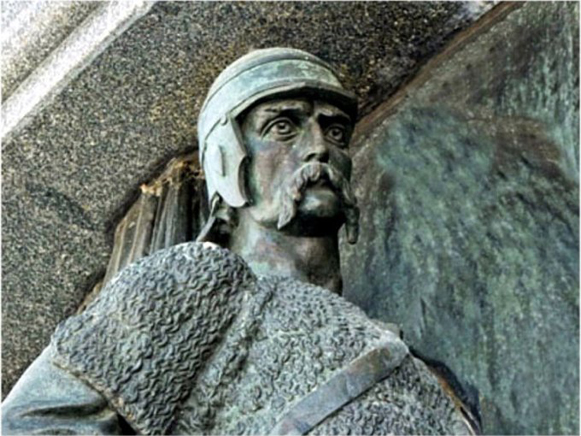Sviatoslav I Ihorovych
Sviatoslav I Ihorovych [Святослав I Ігорович; Svjatoslav Ihorovyč] (appellations: Khorobryi [the Brave] and Zavoiovnyk [the Conqueror]), b 942?, d 972. Grand prince of Kyiv (de jure from 945, de facto from 964) and noted military commander; son of Prince Ihor and Princess Olha. While he was a minor, Sviatoslav's mother was regent of the Kyivan state, and he was raised by a steward, Asmud. During his reign the territory of Kyivan Rus’ was greatly expanded. In his campaigns to the east (964–6) he defeated the Khazars near Itil and captured the White Tower fortress in Sarkil. He later conquered the Volga Bulgars and forced the Yasians and the Kasogians in Subcaucasia to pay tribute, thereby opening the way for Rus’ merchants to the Caspian Sea coast. In 966 he subjugated the Viatichians and exacted tribute from them. The emperor of Byzantium, Nicephorus II Phocas (through the offices of the patrician Kalokir of Chersonese Taurica), convinced Sviatoslav to attack the Balkan Bulgars; he did so in 967 (some historians say 968). He captured many cities (80, according to the chronicles), including Dorostol and Pereiaslavets on the Danube River, an important trading center, where he planned to transfer his capital.
Threatened by his Balkan expansionism, Byzantium convinced the Pechenegs to attack Kyiv. Sviatoslav reluctantly returned and drove the Pechenegs, who already had been repelled from the city, back to the steppe. After Olha's death he consolidated his control of Kyivan Rus’ and appointed his sons as viceregents: Yaropolk I Sviatoslavych in Kyiv, Oleh Sviatoslavych in the Derevlianian land, and Volodymyr the Great in Novgorod the Great. In July 969 Sviatoslav embarked on a second campaign in the Balkans in order to strengthen the conquered cities and to punish Byzantium for provoking the Pecheneg attack on Kyiv. That time, however, he was met by stronger opposition from a combined Bulgarian and Byzantine force. The relatively small size of his army and the lack of assistance from Kyiv were responsible for his defeat near Dorostol (now Silistra). He was besieged by the Byzantine army (23 April to 22 July 971) and forced to sign a peace treaty (23 July), under which he ceded his territories in the Danube region. On the way back to Kyiv he was ambushed by Pechenegs near the Khortytsia Island (once again at the behest of Byzantium). His army was destroyed, and he was slain.
The Primary Chronicle praises Sviatoslav as a heroic figure and describes his cordial relations with his wife. It also remarks on his practice of warning the enemies he was about to attack, with the message ‘Idu na vas’ (I am coming at you). He is the subject of Yuliian Opilsky's novel Idu na vas (1918) and Semen Skliarenko's novel Sviatoslav (1959).
BIBLIOGRAPHY
Zavitnevich, V. ‘Velikii kniaz’ Kyivskii Sviatoslav Igorevich,’ Trudy Kievskoi dukhovnoi akademii, 3 (1888)
Grégoire, H. ‘La derniàere campagne de Jean Tzimisces contre les Russes,’ Byzantion, 12 (1937)
Karishkovskii, R. ‘K khronologii russko-vizantiiskoi voiny pri Sviatoslave,’ Vizantiiskii vremennik, no. 5 (1952)
Stokes, A. ‘The Balkan Campaign of Svyatoslav Igorevich,’ SEER, June 1962
Karyshkovs’kyi, R. ‘Povist’ vremennykh lit pro balkans’ki pokhody Rusi pry kniazi Sviatoslavi,’ Pratsi Odes’koho derzhavnoho universytetu, 152 (1962)
Ševčenko, I. ‘Sviatoslav in Byzantine and Slavic Miniatures,’ SR, 24, no. 4 (1965)
Sakharov, A. ‘Rus’ko-vizantiis’kyi dohovir 971 r.,’ UIZh, 1982, no. 10
Pietkov, S. Zhyttiepys velykoho kyivs’koho kniazia Sviatoslava I Slavnoho (942–972) (Symferopil 2004)
Mykhailo Zhdan, Arkadii Zhukovsky
[This article originally appeared in the Encyclopedia of Ukraine, vol. 5 (1993).]
.jpg)
.jpg)
